1
I love you so much that nothing can matter to me - not even you... Only my love- not your answer. Not even your indifferenceAyn Rand
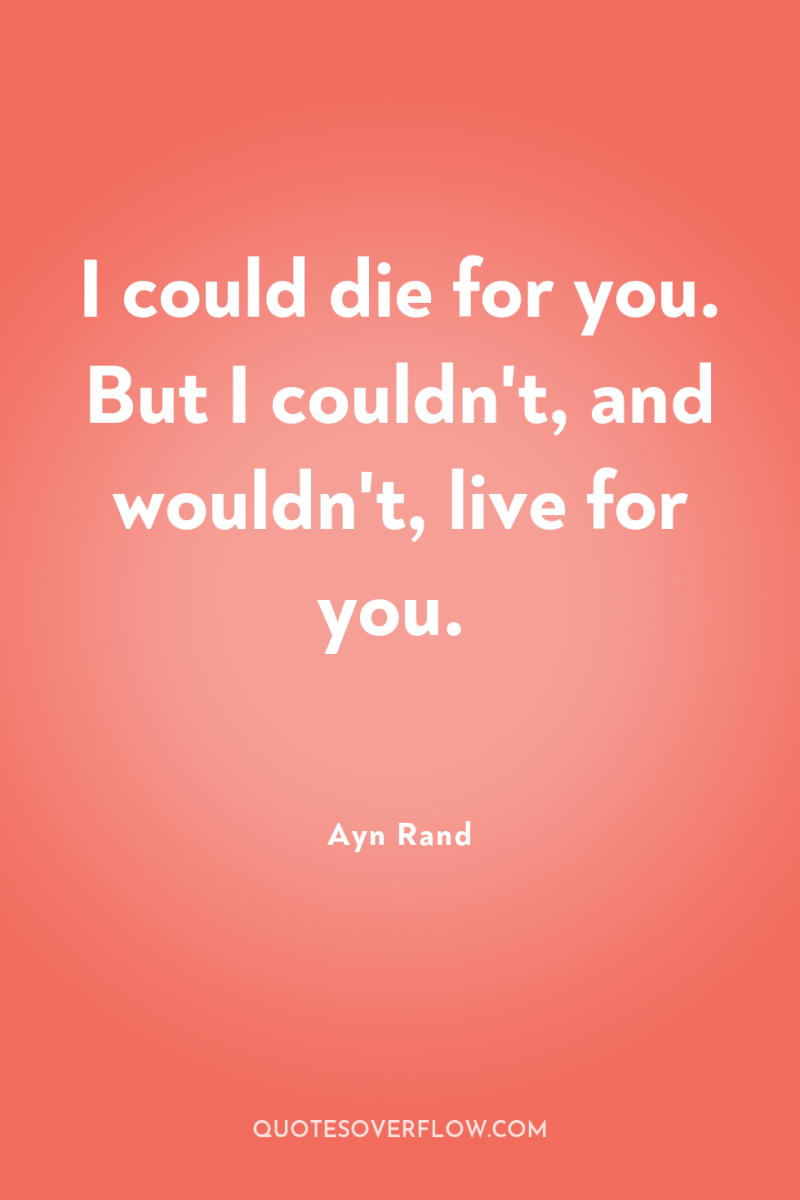
2
I could die for you. But I couldn't, and wouldn't, live for you.Ayn Rand
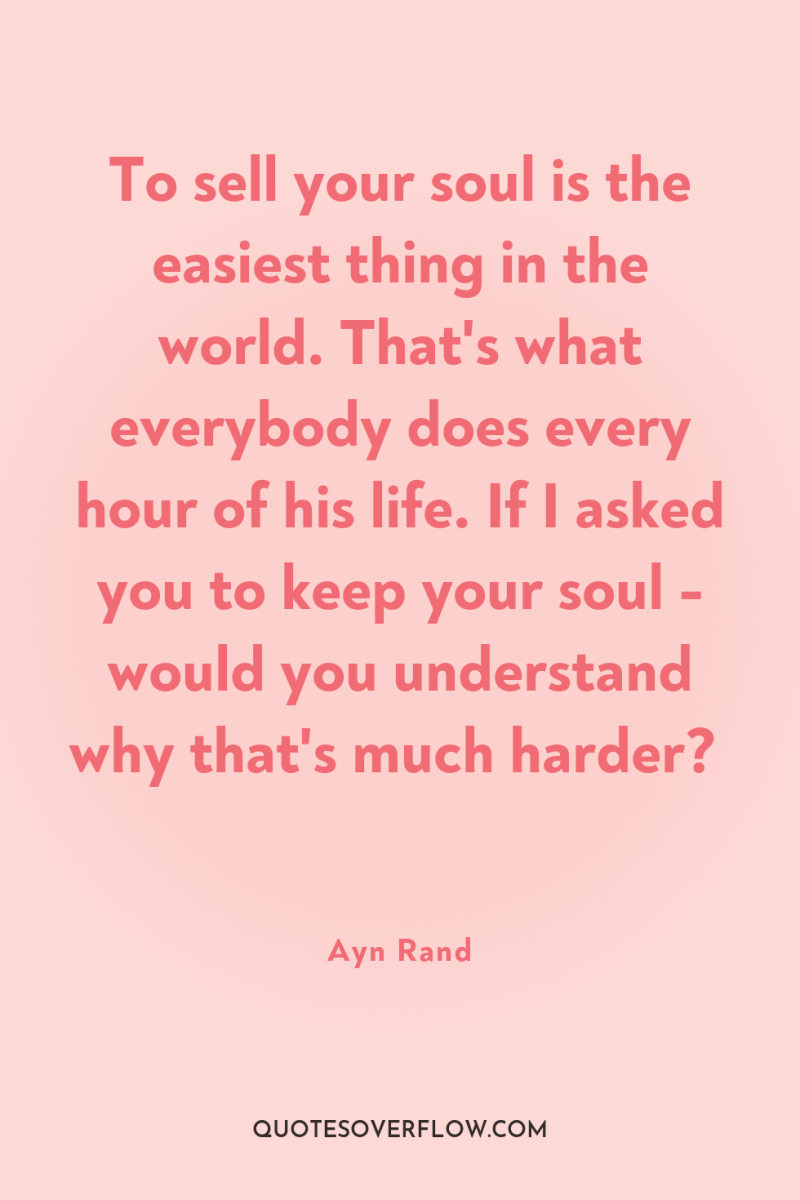
3
To sell your soul is the easiest thing in the world. That's what everybody does every hour of his life. If I asked you to keep your soul - would you understand why that's much harder?Ayn Rand
4
Listen to what is being preached today. Look at everyone around us. You've wondered why they suffer, why they seek happiness and never find it. If any man stopped and asked himself whether he's ever held a truly personal desire, he'd find the answer. He'd see that all his wishes, his efforts, his dreams, his ambitions are motivated by other men. He's not really struggling even for material wealth, but for the second-hander's delusion - prestige. A stamp of approval, not his own. He can find no joy in the struggle and no joy when he has succeeded. He can't say about a single thing: 'This is what I wanted because I wanted it, not because it made my neighbors gape at me'. Then he wonders why he's unhappy. .Ayn Rand
5
I often think that he's the only one of us who's achieved immortality. I don't mean in the sense of fame and I don't mean he won't die someday. But he's living it. I think he is what the conception really means. You know how people long to be eternal. But they die with everyday that passes. They change, they deny, they contradict- and they call it growth. At the end there is nothing left, nothing unreveresed or unbetrayed; as if there had never been an entity, only a succession of adjectives fading in and out of an unformed mass. How do they expect a permanence which they never held for a single moment? But Howard- one can imagine him living forever. .Ayn Rand
6
Why have you been staring at me ever since we met? Because I’m not the Gail Wynand you’d heard about. You see, I love you. And love is exception-making. If you were in love you’d want to be broken, trampled, ordered, dominated, because that’s the impossible, in the inconceivable for you in your relations with people. That would be the one gift, the great exception you’d want to offer the man you loved. But it wouldn’t be easy for you.Ayn Rand
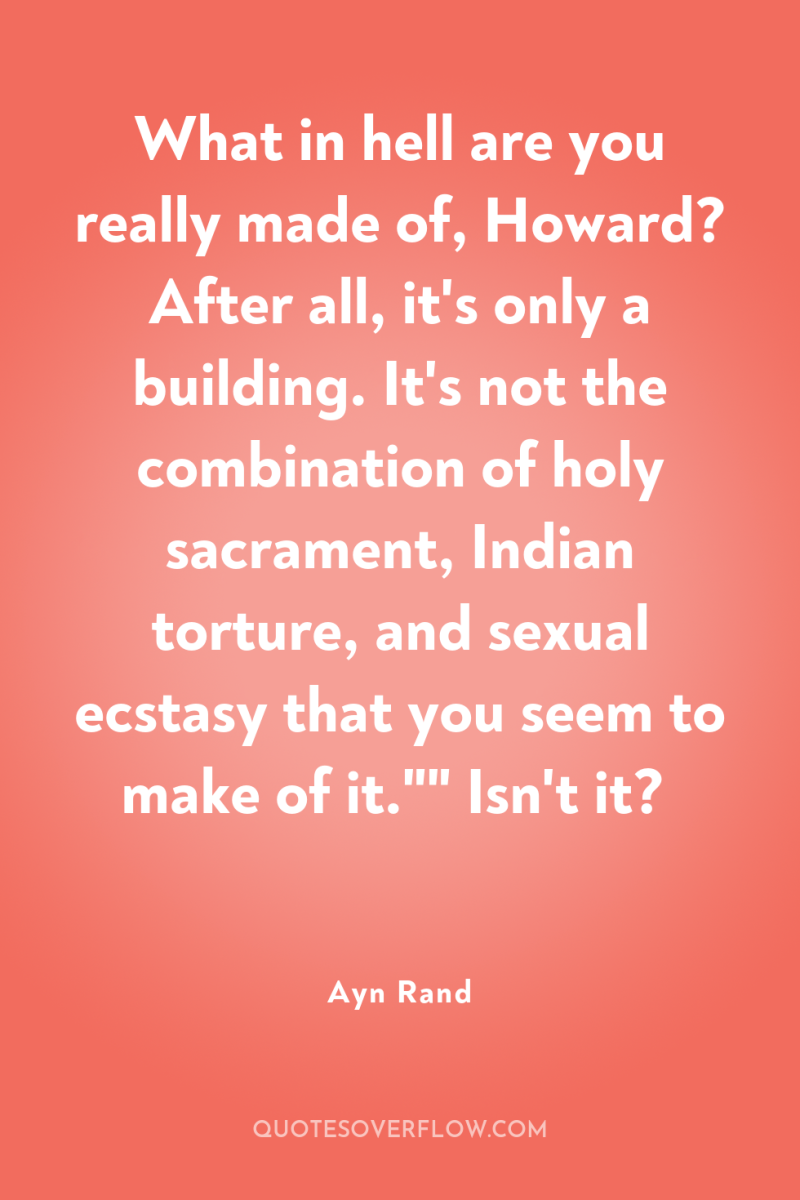
7
What in hell are you really made of, Howard? After all, it's only a building. It's not the combination of holy sacrament, Indian torture, and sexual ecstasy that you seem to make of it."" Isn't it?Ayn Rand
8
He wanted nothing, for the time being, except to understand .... Without advice, assistance or plan, he began reading an incongruous assortment of books; he would find some passage which he could not understand in one book, and he would get another on that subject .... There was no order in his reading; but there was order in what remained of it in his mind.Ayn Rand
9
No! I don't want to speak of that! But I'm going to. I want you to hear. I want you to know what's in store for you. There will be days when you'll look at your hands and you'll want to take something and smash every bone in them, because they'll be taunting you with what they could do, if you found a chance for them to do it, and you can't find that chance, and you can't bear your living body because it has failed those hands somewhere. There will be days when a bus driver will snap at you as you enter a bus, and he'll be only asking for a dime, but that won't be what you hear; you'll hear that you're nothing, that he's laughing at you, that it's written on your forehead, that thing they hate you for. There will be days when you'll stand in the corner of a hall and listen to a creature on a platform talking about buildings, about the work you love, and the things he'll say will make you wait for somebody to rise and crack him open between two thumbnails; and then you'll hear people applauding him, and you'll want to scream, because you won't know whether they're real or you are, whether you're in a room full of gored skulls, or whether someone has just emptied your own head, and you'll say nothing, because the sounds you could make - they're not a language in that room any longer; but you'd want to speak, you won't anyway, because you'll be brushed aside, you who have nothing to tell them about buildings! Is that what you want? .Ayn Rand
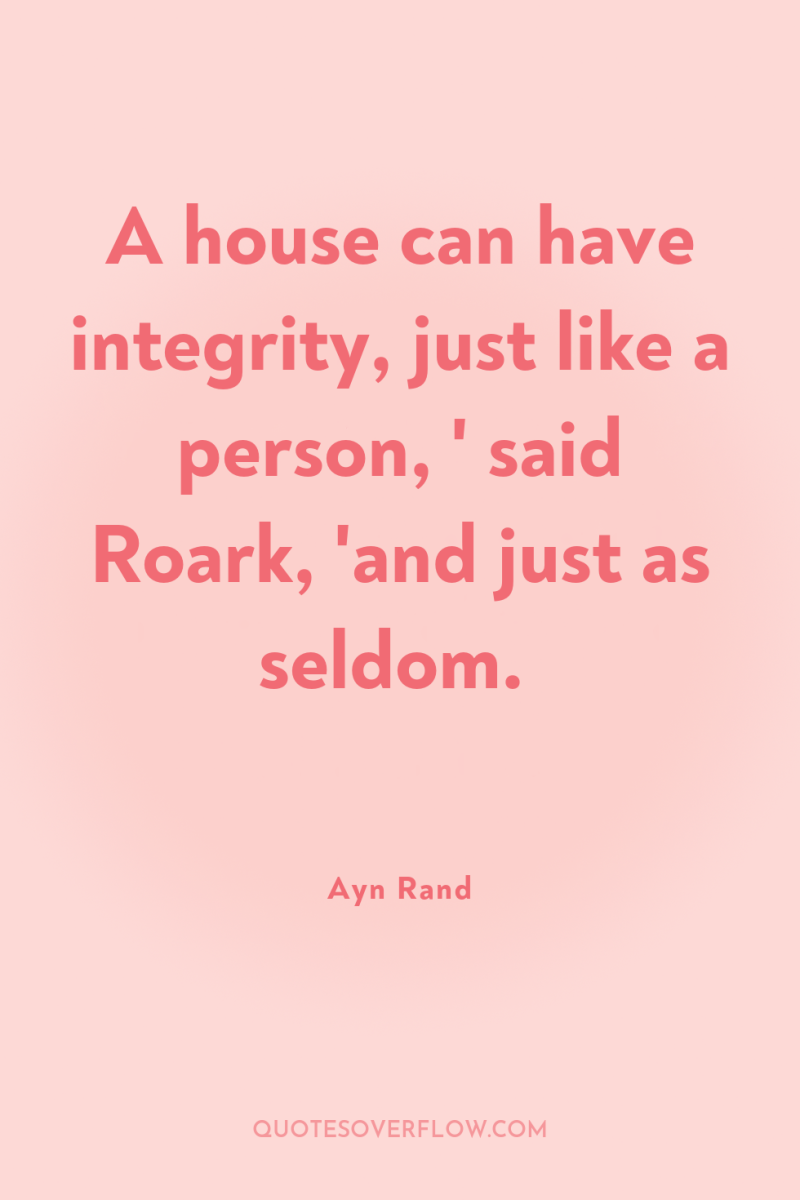
10
A house can have integrity, just like a person, ' said Roark, 'and just as seldom.Ayn Rand
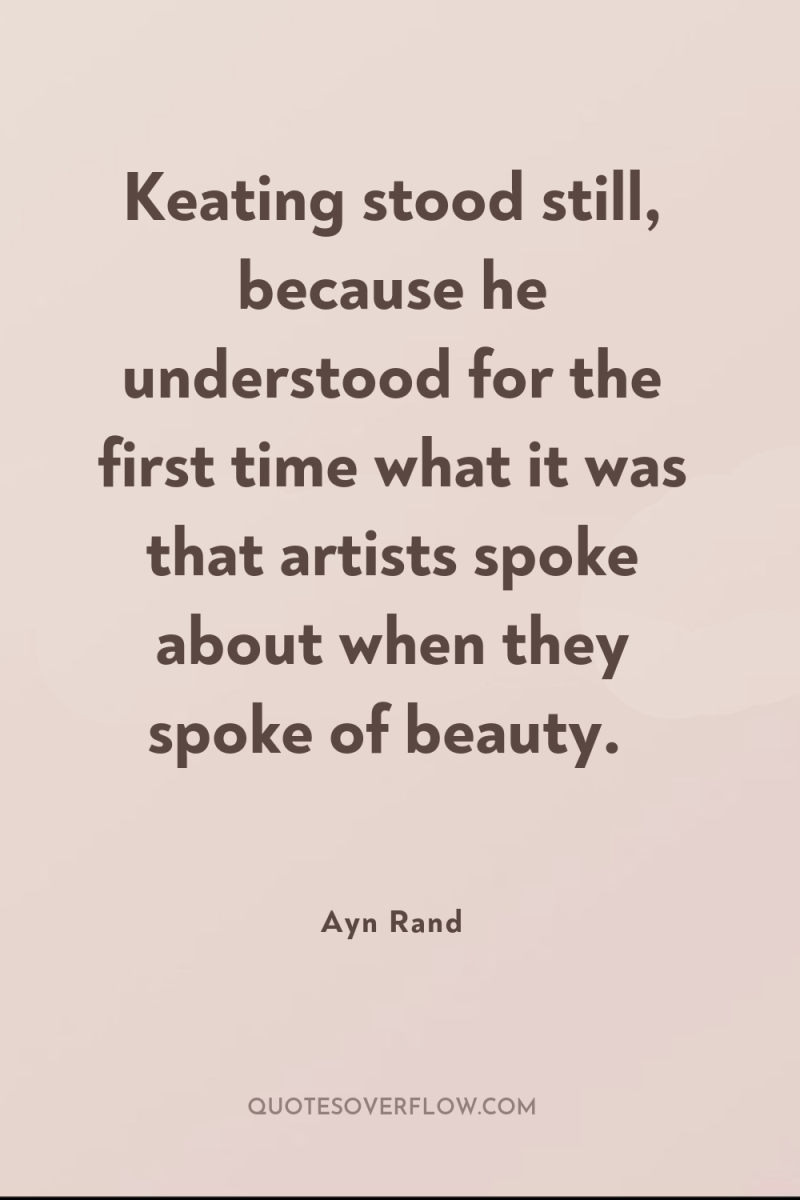
11
Keating stood still, because he understood for the first time what it was that artists spoke about when they spoke of beauty.Ayn Rand
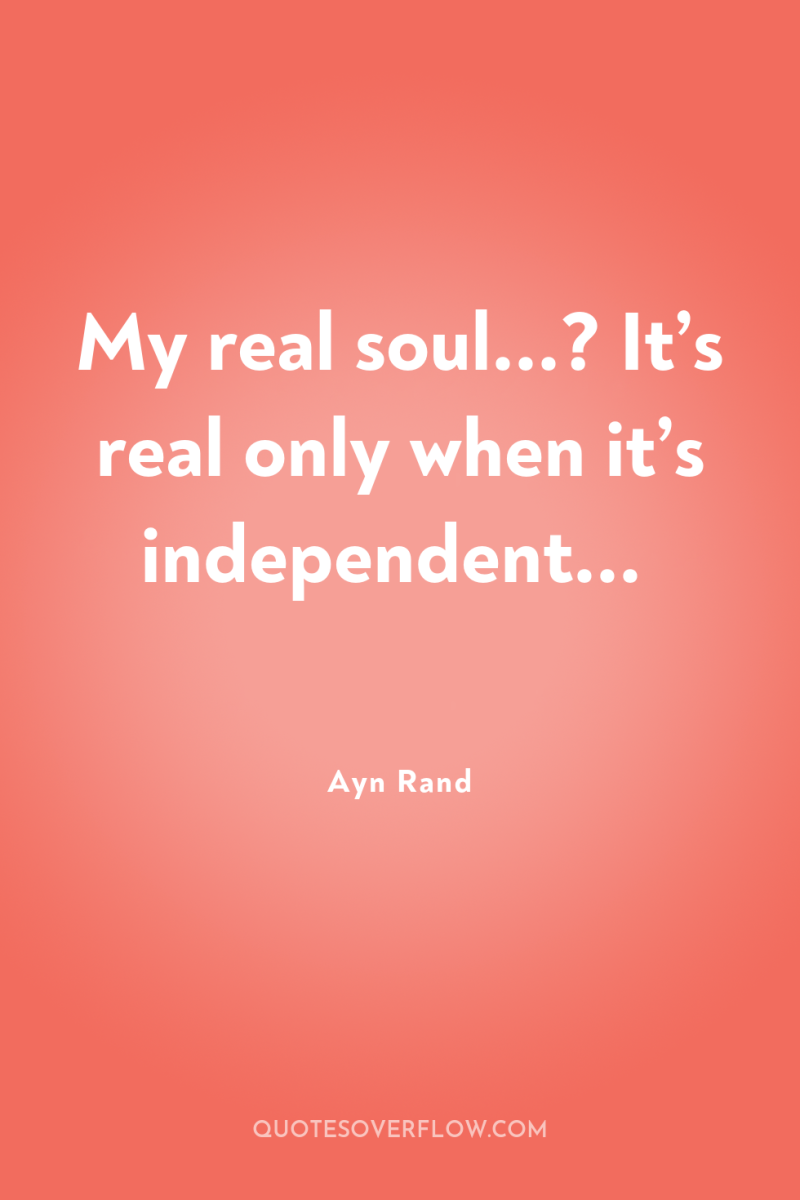
12
My real soul...? It’s real only when it’s independent...Ayn Rand
13
Art is a selective re-creation of reality according to an artists metaphysical value judgments.Ayn Rand
14
Now take a human body. Why wouldn't you like to see a human body with a curling tail with a crest of ostrich feathers at the end? And with ears shaped like acanthus leaves? It would be ornamental, you know, instead of the stark, bare ugliness we have now. Well, why don't you like the idea? Because it would be useless and pointless. Because the beauty of the human body is that is hasn't a single muscle which doesn't serve its purpose; that there's not a line wasted; that every detail of it fits one idea, the idea of a man and the life of a man. .Ayn Rand
15
Man cannot survive except through his mind. He comes on earth unarmed. His brain is his only weapon. Animals obtain food by force. man had no claws, no fangs, no horns, no great strength of muscle. He must plant his food or hunt it. To plant, he needs a process of thought. To hunt, he needs weapons, and to make weapons - a process of thought. From this simplest necessity to the highest religious abstraction, from the wheel to the skyscraper, everything we are and we have comes from a single attribute of man -the function of his reasoning mind.Ayn Rand
16
But I don’t understand. Why do you want me to think that this is great architecture? He pointed to the picture of the Parthenon.That, said the Dean, is the Parthenon.- So it is.- I haven’t the time to waste on silly questions.- All right, then. - Roark got up, he took a long ruler from the desk, he walked to the picture. - Shall I tell you what’s rotten about it?- It’s the Parthenon! - said the Dean.- Yes, God damn it, the Parthenon! The ruler struck the glass over the picture.- Look, - said Roark. - The famous flutings on the famous columns — what are they there for? To hide the joints in wood — when columns were made of wood, only these aren’t, they’re marble. The triglyphs, what are they? Wood. Wooden beams, the way they had to be laid when people began to build wooden shacks. Your Greeks took marble and they made copies of their wooden structures out of it, because others had done it that way. Then your masters of the Renaissance came along and made copies in plaster of copies in marble of copies in wood. Now here we are, making copies in steel and concrete of copies in plaster of copies in marble of copies in wood. Why? .Ayn Rand
17
I’m not capable of suffering completely. I never have. It goes only down to a certain point and then it stops. As long as there is that untouched point, it’s not really pain.Ayn Rand
18
She found a dark satisfaction in pain–because that pain came from him.Ayn Rand
19
He had always wanted to write music, and he could give no other identity to the thing he sought. If you want to know what it is, he told himself, listen to the first phrases of Tchaikovsky’s First Concerto--or the last movement of Rachmaninoff’s Second. Men have not found the words for it, nor the deed nor the thought, but they have found the music. Let me see that in one single act of man on earth. Let me see it made real. Let me see the answer to the promise of that music. Not servants nor those served; not altars and immolations; but the final, the fulfilled, innocent of pain. Don’t help me or serve me, but let me see it once, because I need it. Don’t work for my happiness, my brothers--show me yours--show me that it is possible--show me your achievement--and the knowledge will give me courage for mine.Ayn Rand
20
The mind is an attribute of the individual. There is no such thing as a collective brain. There is no such thing as a collective thought. An agreement reached by a group of men is only a compromise or an average drawn upon many individual thoughts. It is a secondary consequence. The primary act–the process of reason–must be performed by each man alone.Ayn Rand
21
Of course I need you. I go insane when I see you. You can do almost anything you wish with me. Is that what you want to hear? Almost, Dominique. And the things you couldn't make me do – you could put me through hell if you demanded them and I had to refuse you, as I would. Through utter hell, Dominique. Does that please you? Why do you want to know whether you own me? It's so simple. Of course you do. All of me that can be owned. You'll never demand anything else. But you want to know whether you could make me suffer. You could. What of it?" The words did not sound like surrender, because they were not torn out of him, but admitted simply and willingly. She felt no thrill of conquest; she felt herself owned more than ever, by a man who could say these things, know them to be true, and still remain controlled and controlling – as she wanted him to remain.Ayn Rand
22
.each remembered other moments, on a sleepless night, on an afternoon of steady rain, in a church, in an empty street at sunset, when each had wondered why there was so much suffering and ugliness in the world. They had not tried to find the answer and they had gone on living as if no answer were necessary. But each had known a moment when, in lonely, naked honesty, he had felt the need of an answer.Ayn Rand
23
Men hate passion, any great passion. Henry Cameron made a mistake : he loved his work. That was why he fought. That was why he lost.Ayn Rand
24
I love doing it. Every building is like a person. Single and unrepeatable.Ayn Rand
25
.. he had always wondered why the sensations one felt in dreamas were so much more intense than anything one could experience in waking reality–why the horror was so total and the ecstacy so complete–and what was that extra quality which could never be recaptured afterward; the quality of what he felt when he walked down a path through tangled green leaves in a dream, in an air full of expectation, of causeless, utter rapture–and when he awakened he could not explain it, it had just been a path through some woods.Ayn Rand
26
She tried to tear herself away from him. The effort broke against his arms that had not felt it. Her fists beat against his shoulders, against his face. He moved one had, took her two wrists, pinned them behind her, under his arm, wrenching her shoulder blades. She twisted her head back. She felt his lips on her breast. She tore herself free… She fought like an animal. But she made no sound. She did not call for help. She heard the echoes of her blows in a gasp of his breath, and she knew that it was a gasp of pleasure… She felt the hatred and his hands; his hands moving over her body, the hands that broke granite. She fought the last convulsion. Then the sudden pain shot up, through her body, to her throat, and she screamed. Then she laid still. It was an act that could be performed in tenderness, as a seal of love, or in contempt, as a symbol of humiliation and conquest. It could be an act of a lover or the act of a soldier violating an enemy woman. He did it as an act of scorn. Not as love, but as defilement. And this made her still and submit…the act of a master taking shameful , contemptuous possession of her was the kind of rapture she had wanted… .Ayn Rand
27
He’s not really struggling even for material wealth, but for the second-hander’s delusion–prestige. A stamp of approval, not his own. He can find no joy in the struggle and no joy when he has succeeded.Ayn Rand
28
She had never done these things before; she did them expertly. She had a capacity for action, a competence that clashed incongruously with her appearance.Ayn Rand
29
You'll get everything society can give a man. You'll keep all the money. You'll take any fame or honor anyone might want to grant. You'll accept such gratitude as the tenants might feel. And I - I'll take what nobody can give a man, except himself. I will have built Cortlandt. - Howard RoarkAyn Rand
30
The age of the skyscraper is gone. This is the age of the housing project. Which is always a prelude to the age of the cave.Ayn Rand
31
He needed the people and the clamour around him. There was no questions and no doubts when he stood on a platform over a sea of faces; the air was heavy, compact, saturated with a single solvent-admiration; there was no room for anything else. He was great; great as the number of people who told him so. He was right; right as the number of people who believed it. He looked at the faces, at the eyes, he saw himself born in them, he saw himself granted the gift of life. That was Peter Keating, that, the reflection in those staring pupils, and his body was only it's reflection.Ayn Rand
32
When facing society, the man most concerned, the man who is to do the most and contribute the most, has the least say. It's taken for granted that he has no voice and the reasons he could offer are rejected in advance as prejudiced -- since no speech is ever considered, but only the speaker. It's so much easier to pass judgement on a man than on an idea. Though how in the hell one passes judgement on a man without considering the content of his brain is more than I'll ever understand. .Ayn Rand
33
Listen to what is being preached today. Look at everyone around us. You’ve wondered why they suffer, why they seek happiness and never find it. If any man stopped and asked himself whether he’s ever held a truly personal desire, he’d find the answer. He’d see that all his wishes, his efforts, his dreams, his ambitions are motivated by other men. He’s not really struggling even for material wealth, but for the second-hander’s delusion - prestige. A stamp of approval, not his own. He can find no joy in the struggle and no joy when he has succeeded. He can’t say about a single thing: ‘This is what I wanted because I wanted it, not because it made my neighbors gape at me’. Then he wonders why he’s unhappy. .Ayn Rand
34
Stand here, he thought, and count the lighted windows of a city. You cannot do it. But behind each yellow rectangle that climbs, one over another, to the sky - under each bulb - down to there, see that spark over the river which is not a star? - there are people whom you will never see and who are your masters. At the supper tables, in the drawing rooms, in their beds and in their cellars, in their studies and in their bathrooms. Speeding in the subways under your feet. Crawling up in elevators through vertical cracks around you. Jolting past you in every bus. Your masters, Gail Wynand. There is a net - longer than the cables that coil through the walls of this city, larger than the mesh of pipes that carry water, gas and refuse - there is another hidden net around you; it is strapped to you, and the wires lead to every hand in the city. They jerked the wires and you moved. You were a ruler of men. You held a leash. A leash is only a rope with a noose at both ends. .Ayn Rand
35
He knew, while he spoke, that it was useless, because his words sounded as if they were hitting a vacuum. There was no such person as Mrs. Wayne Wilmot; there was only a shell containing the opinions of her friends, the picture postcards she had seen, the novels of country squires she had read; it was this that he had to address, this immateriality which could not hear him or answer, deaf and impersonal like a wad of cotton.Ayn Rand
36
Roark spoke quietly. He was the only man in the room who felt certain of his own words.Ayn Rand
37
The pressure disappeared with the first word he put on paper. He thought--while his hand moved rapidly--what a power there was in words; later, for those who heard them, but first for the one who found them; a healing power, a solution, like the breaking of a barrier. He thought, perhaps the basic secret the scientists have not discovered, the first fount of life, is that which happens when a thought takes shape in words.Ayn Rand
38
But, you see, it's not what you do that matters really. It's only you."" Me what?"" Just you here. Or you in the city. Or you somewhere in the world. I don't know. Just that.Ayn Rand
39
In all proper relationships there is no sacrifice of anyone to anyone.. Men exchange their work by free, mutual consent to mutual advantage when their personal interests agree and they both desire the exchange. If they do not desire it, they are not forced to deal with each other. They seek further. This is the only possible form of relationship between equals. Anything else is a relation of slave to master, or victim to executioner.Ayn Rand
40
The first right on earth is the right of the ego. Man’s first duty is to himself. His moral law is never to place his prime goal within the persons of others. His moral obligation is to do what he wishes, provided his wish does not depend primarily upon other men.Ayn Rand
41
The people had come to witness a sensational case, to see celebrities, to get material for conversation, to be seen, to kill time. They would return to unwanted jobs, unloved families, unchosen friends, to drawing rooms, evening clothes, cocktail glasses and movies, to unadmitted pain, murdered hope, desire left unreached, left hanging silently over a path on which no step was taken, to days of effort not to think, not to say, to forget and give in and give up. But each of them had known some unforgotten moment-a morning when nothing had happened, a piece of music heard suddenly and never heard in the same way again, a stranger's face seen in a bus-a moment when each had known a different sense of living. And each remembered other moments, on a sleepless night, on an afternoon of steady rain, in a church, in an empty street at sunset, when each had wondered why there was so much suffering and ugliness in the world. They had not tried to find the answer and they had gone on living as if no answer was necessary. But each had known a moment when, in lonely, naked honesty, he had felt the need of an answer.Ayn Rand
42
What is kinder--to believe the best of people and burden them with a nobility beyond their endurance--or to see them as they are, and accept it because it makes them comfortable?Ayn Rand
43
Self-sacrifice? But it is precisely the self that cannot and must not be sacrificed.Ayn Rand
44
A man’s spirit is his self. That entity which is his consciousness. To think, to feel, to judge, to act are functions of the ego.Ayn Rand
45
Men have been taught that the ego is the synonym of evil, and selflessness the ideal of virtue. But the creator is the egotist in the absolute sense, and the selfless man is the one who does not think, feel, judge or act. These are functions of the self.Ayn Rand
46
..it is precisely the self that cannot and must not be sacrificed. It is the unsacrificed self that we must respect in man above all.Ayn Rand
47
The faces stood out, separate, lonely, no two alike. Behind each, there were the years of a life lived or half over, effort, hope and an attempt, honest or dishonest, but an attempt. It had left on all a single mark in common: on lips smiling with malice, on lips loose with renunciation, on lips tight with uncertain dignity–on all–the mark of suffering.Ayn Rand
48
I want to sleep with you. Now, tonight, and at any time you may care to call me. I want your naked body, your skin. your mouth, your hands...– I want you like an animal...or a whore.Ayn Rand
49
I want to sleep with you. Now, tonight, and at any time you may care to call me. I want your naked body, your skin. your mouth, your hands... I want you like an animal...or a whore.Ayn Rand
50
When they lay in bed together it was–as it had to be, as the nature of the act demanded–an act of violence. It was surrender, made the more complete by the force of their resistance. It was an act of tension, as the great things on earth are things of tension. It was tense as electricity, the force fed on resistance, rushing through wires of metal stretched tight; it was tense as water made into power by the restraining violence of a dam. The touch of his skin against hers was not a caress, but a wave of pain, it became pain by being wanted too much, by releasing in fulfillment all the past hours of desire and denial.Ayn Rand